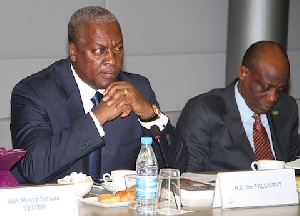...as inflation, deficit-fear push up yields
Government’s short-term borrowing costs are picking up again as a disturbing combination of surging inflation, a tumbling currency and the prospect of the budget deficit exceeding the target drive down investor sentiments.
The cost of 91-day borrowing rose for a sixth straight week to 19.62 percent on January 24, when the last auction of the bills was held. The yield on the debt rose nearly one percentage point in the six-week period, reaching its highest since November 1. The yield on 182-day bills also increased for four straight weeks since December 27 to 19.44 percent on January 24.
Yields on one- and two-year debt, which have more or less stabilised, as well as bond yields may also pick up as the Bank of Ghana’s (BoG) attempts to engineer a downward-sloping yield curve -- the situation in which yields rise with longer maturities -- backfires, warned Dr. Joe Abbey, economist and head of the Centre for Policy Analysis (CEPA).
“For some time, we were wondering how yields could be falling when inflation was picking up. But clearly, there’s a trend reversal in the market,” he said. Inflation soared to 13.5 percent in December, 4.5 percentage points above the central bank’s key target.
Dr. Abbey said foreign investors -- whose bids for a higher interest rate on seven-year debt sold in November were rejected -- will return demanding high yields when the first three-year bonds in 2014 are sold next month.
The last sale of the bonds, in May 2013, was at a yield of 19.24 percent, but foreign investors -- who can only buy debt of three-year maturity or longer -- are set to bid for higher rates due to the sliding cedi, which has lost 21 percent to the dollar from a year ago.
“There’s a certain reality confronting us next month. The BoG shut out foreign investors last time, but now the chickens are coming home to roost and the three-year rate could shoot up,” said Dr. Abbey. “The reality is that foreign investors do not seem to be impressed, and by many criteria Ghana’s [foreign exchange] reserve adequacy is questionable.”
Reserves rose by US$300million to US$5.6billion in the 11 months to November 2013, but fell in terms of import cover from 3 months to 2.9 months, the central bank said in November.
It also said it will introduce rules to harmonise the way banks trade foreign currency and quote the exchange rate of the cedi, a move expected to improve transparency amid a wide disparity between official exchange rates and those quoted by banks.
The regulator will also allow banks to sell the yuan, the Chinese currency, to traders who import from the Asian nation as the current reliance on dollars puts pressure on the cedi. Chinese trade with Ghana topped US$5billion in 2012 from US$434million in 2005 as more Ghanaian businesses started sourcing goods from the world’s second-biggest economy, where suppliers are noted for their cheap prices.
Soaring interest rates may also reflect concern about the government’s deficit, which could rise above a projected 10.2 percent of GDP for 2013. Aside more borrowing to clear payment arrears, the government will find it difficult to get the deficit down and stabilise debt ratios as economic growth -- which averaged more than 8 percent per annum between 2008 and 2012 -- begins to falter.
According to CEPA, GDP growth -- which plunged to a record low on quarterly basis between July and September last year -- may at best be 4.8 percent for 2013, meaning a bigger deficit and more trouble with international ratings agencies.
Fitch Ratings downgraded the country late last year, while Moody’s and Standard & Poor’s put it on a negative outlook, implying a high likelihood of a downgrade.
“We need to get back to what was the final deficit outcome of 2013. Even the projected outcome of 10.2 percent was very disappointing,” said Dr. Abbey.
Business News of Friday, 31 January 2014
Source: B&FT
Government borrowing gets more costly
Entertainment












